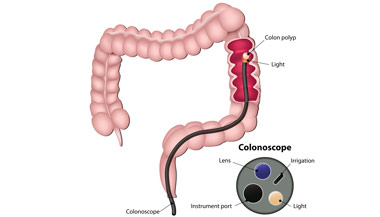Colon Cancer Treatment: What to Know About Surgery
Several treatment options are available for individuals who have been diagnosed with colorectal cancer. Doctors can often effectively treat this cancer, even in later stages. One treatment method is surgery.
Johns Hopkins colorectal surgeons provide information to those who may be concerned about undergoing surgery.

Colon Cancer: When Surgery Makes Sense
According to our colorectal surgeons, almost all patients with colorectal cancer are candidates for surgery. If you have been previously told that you are not a candidate for surgery, consider seeking a second opinion.
Before deciding whether (and which) surgery is right for you, your doctor will consider many factors. These include:
Colon Cancer Stage
Staging information tells doctors where the cancer is located, and if it has spread beyond the colon. This helps doctors determine the best treatment option.
Stages 1 to 3: In general, surgery is considered the best choice for colon cancers stages 1 to 3:
- Stage 1 and 2 cancer is contained to the wall of the colon and possibly nearby tissue.
- Stage 3 cancer has spread from the colon to nearby lymph nodes, but not to other parts of the body.
Stage 4: At stage 4, the cancer has spread to other organs, such as the liver or lungs. Johns Hopkins doctors have, at times, used surgery to treat patients with stage 4 colon cancers. Radiation therapy or chemotherapy may also be necessary at this stage.
Cancer Size and Location
Certain surgeries are better suited for cancer, or lesions, that sit along certain sides of your colon. Your doctor will consider the location, size and number of lesions before determining treatment.
Colon Cancer vs. Rectal Cancer
Sometimes, rectal cancers are more aggressive than colon cancers. If you have rectal cancer, your doctor may recommend radiation therapy before surgery. Radiation can shrink the size of the lesion and lead to a better surgical result.
Colon Cancer: Surgical Approaches
There are two main approaches to colon cancer surgery:
Open surgery: In the more conventional approach, a medical team will access your colon through an incision and remove all the cancerous tissue. Doctors may also remove nearby lymph nodes to assess whether the cancer has spread.
Minimally invasive surgery: In this newer approach, doctors use laparoscopic techniques or robotic technology. These procedures use smaller incisions compared with an open surgery. The goal is the same: Remove the entire cancer, possibly removing lymph nodes as well.
With minimally invasive procedures, patients experience:
- Less pain (and less need for pain medications)
- Less time at the hospital
- A shorter recovery, allowing them to get back to work and everyday activities more quickly
If you’ve been diagnosed with advanced colon or rectal cancer, your doctor might recommend additional treatment before or after surgery. This can include:
- Radiation
- Chemotherapy





